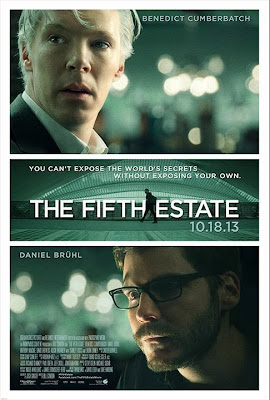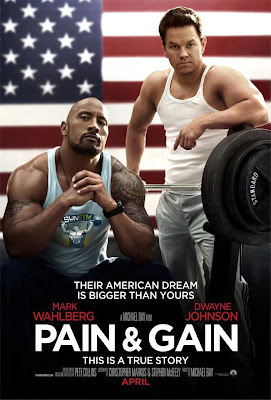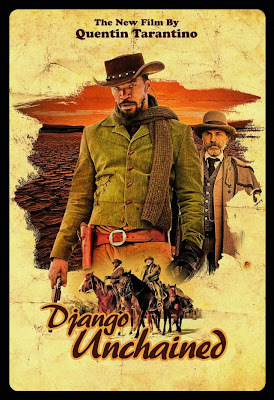‘The Fifth Estate’ Has Plenty of Leaks
The
Fifth Estate: 2 out of 5
Julian
Assange: Man is least himself when he
talks with his own person. But if you give him a mask, he will tell you the
truth.
It is almost funny how
long I put off actually writing a review for The Fifth Estate, the Bill Condon-directed film, which adapts two
different books that focus on the news-leaking website WikiLeaks and its
founder, Julian Assange. The delay is
not because I had a lot to consider, after seeing the film. It is actually quite the opposite. The
Fifth Estate left me feeling with almost nothing, as the film is all over
the place in presentation, one-sided in its overall viewpoint, and stands more
as a shell containing a great performance from stars Benedict Cumberbatch and
Daniel Bruhl, which would break apart quite easily without them. It is unfortunate, as I believe there could
have been a way to make this story more interesting, especially given the
talent involved.
The film begins by
throwing you into a series of events already in progress. We get a basic understanding of what WikiLeaks
is, only because of the introduction of Julian Assange (Cumberbatch) relies on
him explaining his own personal thesis for what it represents. Assange is joined early on by fellow hacker Daniel
Domscheit-Berg (Daniel Bruhl), who becomes another member of the WikiLeaks
team, which essentially serves as an underdog watchdog over powerful
people. The two hackers work as best
buds with an idea in mind that involves stopping corruption that seems to be in
plane site, such as large banks that deal in intolerable practices, but Assange
wants to go further. He eventually gains
access to the largest amount of confidential intelligence documents in U.S.
history, which could possibly put a number of people in jeopardy. The question of whether or not exposing
secrets in a free society has a cost becomes the subject for all involved to
consider.
One of the only interesting
things I have taken away from The Fifth
Estate is how the real Julian Assange has gone out of his way to denounce
this film (spoiler alert: Assange does not die at the end of The Fifth Estate). Regardless of my thoughts on this subject and
what Assange has done in real life, he presents a point, as this film pretty
much does everything it can to take this man down, after setting him up as a
guy fighting for a greater good. This
would feel like less of a problem if the film had anything more interesting to
say, but it instead feels like an information dump from specific sources, with
some snazzy cinematography and editing to give the film an edgy vibe. Films that deal with a modern times issue and
somehow still manage to be quite entertaining are all well and good, but The Fifth Estate is most definitely not
in the same league as something like The
Social Network.
Based on two books: WikiLeaks:
Inside Julian Assange's War on Secrecy by David Leigh and Luke Harding
and Inside WikiLeaks: My Time with Julian Assange and the World's Most Dangerous
Website
by Daniel Domscheit-Berg, screenwriter Josh Singer provides the film with a structure that feels headed in an interesting direction, only to end up feeling unfocused, but still manages to throw a lot of negativity towards Assange, who ultimately serves as a mysterious fellow with a history shrouded in possible strange activities that necessitate his platinum hair, obsessiveness, and a mocking sort of attitude towards those who get in his way. On the other side we have Daniel, who is portrayed as conflicted, but ultimately principled in what he thinks is right. I guess it helps when it is your book being adapted into a film to be more easily painted as the “good guy.”
The film may be
unsuccessful in balancing the various aspects of this story, but at least
Cumberbatch and Bruhl deliver strong work, particularly in their scenes
together, as the duo has great chemistry.
Cumberbatch will rightfully walk away with the most praise, as he really
dives into this persona of Assange, complete with the very specific accent and
the kind of confidence it would take to be the kind of man that this film is
showing us. Bruhl is solid here too,
even if a lot of his work involves him furrowing his eyebrows when the going
gets tough or looking timidly at computer monitors, as he realizes why he and
Assange need to change up their game plan or else. Still, between this film and Rush, Bruhl is certainly on the rise as
an actor, just hopefully not in these bland Hollywood-ized retellings of
stories.
Being bland is another
big issue of the film. Even if it does
away with being a focused, fact-based analysis of the ethics of something as
important as leaking highly secretive knowledge to the public, settling for a
trashy, techno-thriller would be more entertaining if the film actually was
made as such. Unfortunately, it isn’t. Clocking in at just over two hours, The Fifth Estate is long and feels that
way, as the film shows lots of scenes of intense typing and attempts to include
a number of additional subplots that end up feeling like a waste of time. This most notably occurs when the film
attempts to add some stakes in the form of a nice Middle Eastern man played by
Alexander Siddig, whose life could be in jeopardy if Assange goes through with
his biggest leak. Given that this is a
film about hackers posting information, this feels more like a strange
digression from the film’s most palpable aspect, rather than an interesting
result of how WikiLeaks could put someone in harm’s way.
Director Bill Condon
does try to add some slickness to the film, but if often times feels either out
of place or as if the film is trying too hard.
The opening title sequence, for example, is a sort of visual log that
tracks the rise of reporting throughout time, which is weird when you consider
that the image of hieroglyphics will still be on your mind ten minutes later,
when the characters arrive at a techno-infused rave and the metaphoric depiction
of a group of bloggers hard at work is an endless sea of desks with laptops on
them. Elsewhere, The Fifth Estate continually progresses through time with the use
of montage sequences; enough to put a Rocky
movie to shame. The attempts to
bring more life to this film go from admirable to remarkably unnecessary, as I
found myself in greater desire of searching Wikipedia to learn more about
WikiLeaks, rather than contend with this film.
It may be worth noting
that this film does have a large supporting cast that includes Laura Linney,
Anthony Mackie, Stanley Tucci, David Thewlis, Alicia Vikander, and more, but
the film is at its best when it deals with a friendship and how it became
fractured. The final act of this film
also proved to be more entertaining, only to haphazardly close on the typical “where
are they all now,” text, along with a strange filmmaker choice to have Cumberbatch
as Assange address a camera with a cheeky, self-aware bit. If only the film could have earned this type
of closure.
Julian
Assange: If we could find one moral man,
one whistle-blower. Someone willing to expose those secrets, that man can
topple the most powerful and most repressive of regimes.
Aaron
is a writer/reviewer for WhySoBlu.com.
Follow him on Twitter @AaronsPS3.
He also co-hosts a podcast, Out Now with Aaron and Abe, available via iTunes or at HHWLOD.com.
He also co-hosts a podcast, Out Now with Aaron and Abe, available via iTunes or at HHWLOD.com.











Comments
Post a Comment